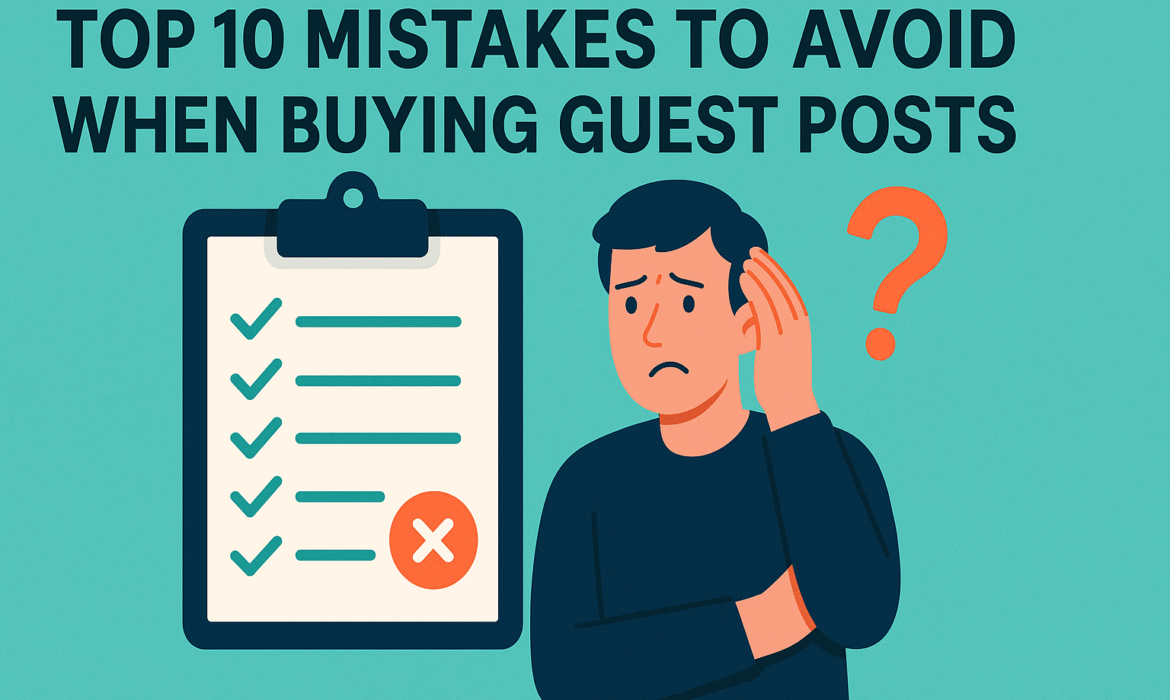
Guest posting is one of the most effective ways to build backlinks, gain exposure, and improve website rankings. It can help businesses connect with new audiences and increase brand trust. But not all guest posts give good results. Many people make costly mistakes when buying them. These errors can waste time, money, and even harm your site.
If you plan to invest in guest posts, you need to be careful. Knowing what to avoid can save you from trouble. This article covers the ten most common mistakes people make when purchasing guest posts. Learn how to spot these problems early, so you can get the most from your investment.
Many sellers promise fast results and high authority links. Some of them deliver. But others use shady tactics or fake metrics. If you’re not careful, you might end up with links that do more harm than good. That is why understanding the basics is important before you buy anything.
Take your time and read through each section. It will help you make better choices when buying guest posts. These tips will give you more value for your money and help your SEO in the right way.
1. Choosing Sites Without Real Traffic
A guest post is not just about a backlink. It’s also about reaching real readers. Many sellers offer links on sites that look fine on the surface but have no actual traffic. These sites often exist only to sell links.
If a site has no real audience, your post will not help much. Always check traffic using tools like Ahrefs or SimilarWeb. A good site should show steady visits and have signs of real user activity.
2. Ignoring the Site’s Niche
Relevance matters a lot. A backlink from a random site will not carry much value. Search engines look at the topic of the linking site. If the site is unrelated to your business, it may not help your SEO.
For example, if you run a fitness brand, a link from a pet blog won’t look natural. Try to get links from websites that match your industry. It shows your site is part of a real community.
3. Not Checking Domain History
A domain’s past can affect its present. Some sites used to be spam or had a bad reputation. If the domain was penalized before, links from it can hurt your site.
Use the Wayback Machine to view how the site looked in the past. Also, check if it had any spammy content. Make sure the domain has a clean record before you buy a guest post on it.
4. Relying Only on Domain Authority
Domain Authority (DA) is a popular metric, but it can be misleading. Some sellers boost DA using fake links. A high DA does not always mean high quality.
Look beyond just the number. Check if the site ranks for keywords. See if it appears on Google. Focus on real-world signals, not just a single metric.
5. Falling for Low Prices
Cheap guest posts often come with hidden costs. Low prices may seem attractive, but they usually mean low quality. You may get a post on a spam site or one that offers links to anyone.
Always ask why a price is low. Check the quality before you decide. Paying a bit more for a strong link is better than wasting money on a bad one.
6. Using Over-Optimized Anchor Text
Search engines look at anchor text when ranking pages. But using exact-match keywords too much can raise flags. It’s better to mix anchor texts and keep them natural.
Use brand names, generic terms, and variations of your keyword. This helps build a natural link profile. It also reduces the risk of a penalty.
7. Not Reviewing the Content Quality
Some sellers provide very poor content. They stuff it with keywords and add little value. Bad writing can make the link less effective and hurt your brand image.
Ask to see a sample post. Check the writing style and tone. Make sure the article looks natural and offers useful information. Good content increases the chances of readers clicking your link.
8. Ignoring the Link Placement
Where your link appears matters. Links hidden in the author bio or footer have less value. Links placed inside the main body of the article get more attention.
Make sure your link is part of the content. It should feel natural and fit the topic. The right placement boosts click-through and sends stronger signals to search engines.
9. Buying Too Many Links at Once
Getting too many links in a short time can look suspicious. Search engines may think you’re trying to manipulate rankings. This can lead to a penalty.
Buy guest posts at a steady pace. Focus on quality over quantity. A few solid links are worth more than many weak ones.
10. Not Tracking Results
Many buyers never check how their links perform. They spend money but don’t measure results. This leads to waste and missed chances to improve.
Use tools like Google Analytics or Ahrefs to track traffic and rankings. Monitor each post and adjust your strategy. Over time, this helps you get better returns.
Conclusion
Buying guest posts can help grow your site, build backlinks, and boost visibility. But only if you do it the right way. Many people rush in without enough care. They end up buying from the wrong sites or falling for fake metrics.
Before you buy, take time to check the site’s quality, relevance, and history. Avoid shortcuts and cheap offers that seem too good to be true. Focus on value, not just price. A well-placed guest post on a good site can do more for your SEO than a dozen poor links.
Remember, guest posting is not only about backlinks. It’s also about reaching new readers and building authority in your niche. Choose wisely, and your investment will pay off in the long run.



